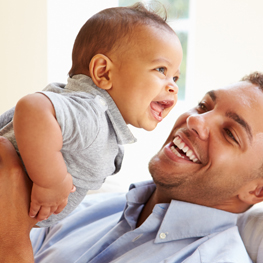
We develop communication skills in many stages, through many kinds of experiences and interactions. As we grow, the ways that we communicate evolve and change. This begins almost as soon as a baby is born - and the main way young babies communicate is by crying. As your baby grows, her communication becomes easier to understand and she’ll move toward what interests her, using sounds, facial expressions and gestures along the way.
When you talk to your baby, she learns the sounds and words in your language:
She’ll learn to talk by hearing your words, songs and stories. You may feel silly talking to your baby, but this is exactly what she needs.
Your baby loves voices and faces. Look into her eyes and smile, talk or sing softly when you’re holding, feeding and playing with her.
Notice what interests her by identifying the things she’s looking at, touching, smelling, hearing and tasting. Talk about what she’s paying attention to so that she can start to attach meaning to your words.
When you copy her sounds, your baby learns that she’s able to make noises that sound like your speech. At first you copy her and soon she’ll copy you. This helps build the brain connections needed for speech and language.
Before you know it, your toddler will start using more words. At first she’ll learn new words slowly. Once your toddler is about two years old, she’ll learn new words at a faster rate until she has a word for almost everything - it’s like an explosion of language. By the time she’s three, her words will become even easier to understand, and she’ll be able to tell you what she did at the park and talk about the things that interest her.
You can help your toddler’s language and communication skills develop by listening and talking with her so that she can learn to understand and use new words in short sentences and conversations:
Add to what your child has said and she’ll start speaking in longer phrases. For example, if she says “Daddy,” use it in a short sentence (e.g. “Daddy’s home now”).
Repeat what your child says correctly, without telling her she said it incorrectly. You can also stress the word in your own speech. For example, if she says “dama,” say, “Yes, that’s grandma. You love grandma.”
Pause and wait after asking a question or making a comment - she needs time to put her thoughts and ideas into words.
Ask questions that keep the conversation going. Open questions encourage children to answer with more words (e.g. “What happened?” or, “What could we do now?”).
Join in and play with your child, while talking about the things you’re playing with.
Read books and sing songs. Talk about how books relate to her experiences. If you read a book about a farm, you could say, “Do you remember when we saw the kittens at the farm?”
Before you know it, your child will be a preschooler showing amazing developmental changes in language. She’ll quickly learn many words that describe people, places, things, actions and experiences in their world. Your child will move from short sentences that leave out some words (e.g. “Big dog coming now”) to simple, complete sentences (e.g. “The big dog is coming to my house”).
By taking time every day to talk with your child, you’ll see her speech and language skills develop. You’ll also enjoy watching her communication skills grow as she discovers the world around her.
This information contains excerpts from Alberta Health Services’ Healthy Parents, Healthy Children print and online resources. For more information on topics related to pregnancy and being a parent, go to healthyparentshealthychildren.ca.
The Healthy Parents, Healthy Children project is part of the Healthy Children and Families team at Alberta Health Services. Visit healthyparentshealthychildren.ca or visit your local community/public health centre for a print copy. Find them on Facebook at Healthy Parents, Healthy Children or follow them on Twitter @AHS_HPHC. For questions or comments, contact This email address is being protected from spambots. You need JavaScript enabled to view it..
Calgary’s Child Magazine © 2024 Calgary’s Child